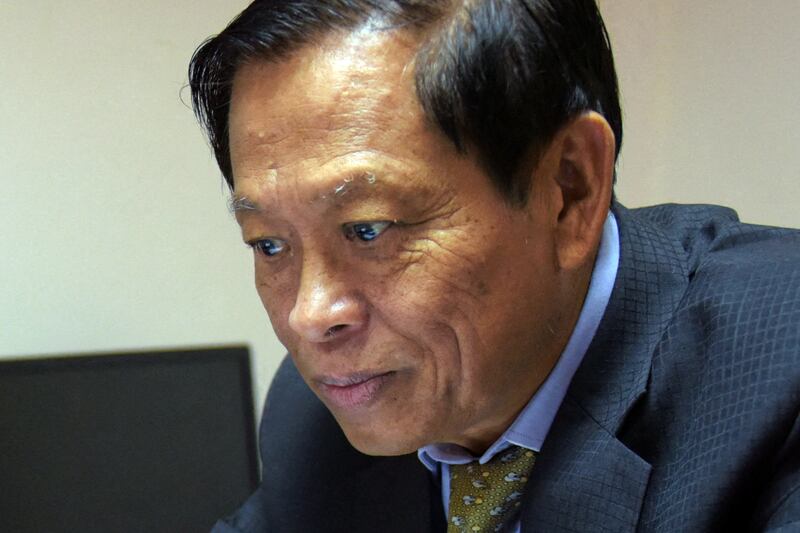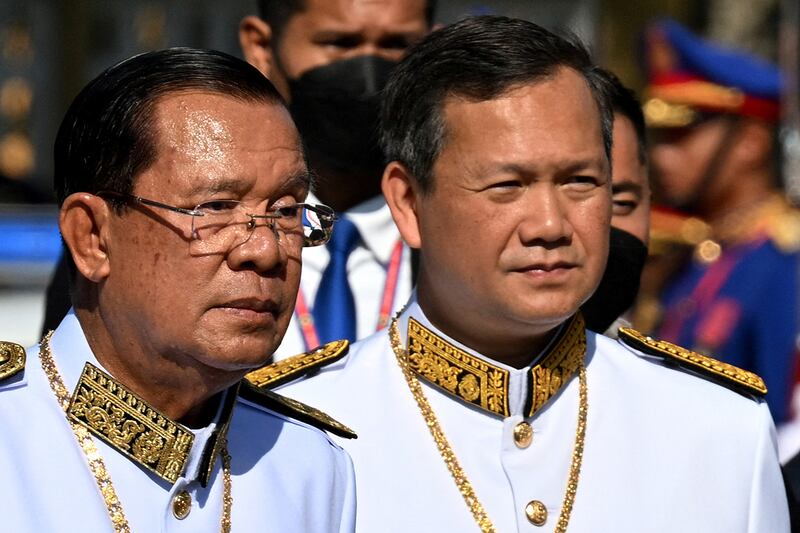When a footman finds a pest in the pantry, does he ask the King whether he should stamp on it? What about if the King has been speaking for years about the need to “crush” and “destroy” and “eliminate” pests that infect his palace?
Early last month, a former Cambodian opposition politician, Lim Kimya, was shot dead in the streets of Bangkok. The Thai police are still investigating the crime, but we know that several suspects are tied to elite Cambodian politics, including one who was an advisor to Hun Sen, the ruling party chief and former prime minister.
Sam Rainsy, the exiled opposition leader, is convinced that Prime Minister Hun Manet, who took over from his father in 2023, and Hun Sen were personally behind the assassination.

The ruling Cambodian People’s Party, or CPP, denies this. On Jan. 20, Hun Manet gave the government’s most effusive statement of denial thus far. “If we were truly behind this assassination,” Hun Manet said, “we would have taken sufficient measures to hide the killers.
Instead, we handed over the killer to Thailand at the request of that country’s authorities, which proves that we are not involved in this assassination.”
That may not have been the clincher that Hun The Younger thought it was. One might enquire as to how Hun Manet knows what the ruling party would have done had it contracted an assassination. Moreover, it could have been an incompetent operation.
And many hitmen are paid not only to kill but also to do the years in prison after having given a false reason for the crime. The social commentator Kem Ley was shot dead at a Phnom Penh petrol station in 2016, apparently over a personal debt — a very dubious motive.
Respect or violence?
Nevertheless, let’s accept Hun Manet’s reasoning. Yet much comes down to what he means by being “behind the assassination.” Sam Rainsy and some others are convinced it was a direct order from the very top.
Yet the government’s own laws make illegal “incitement to commit a felony or disturb social security.”

So I ask: can anyone who has listened to Hun Sen over the past few years think that he doesn’t want political opponents to be killed? Put differently, suppose you’re an enterprising upstart who wants to please his political masters or a recent convert to the CPP cause.
If you had even only given a cursory glance over Hun Sen’s comments, would you think that the most powerful man in the land, who has ruled for more than four decades, wants you to treat political opponents with utmost respect and toleration or would you think he wants you to treat them with utmost violence?
He was talking about something different, but Sok Eysan, the CPP’s greying spokesperson, noted in November that “statements from the party’s leader [Hun Sen] often translate into action.”
Indeed, Cambodian politics often resembles working towards the Samdech. So let’s take a few examples of Hun Sen’s statements over the past few years. Last June, an audio recording was leaked of him imploring supporters to “smash” and “destroy” opposition activists. “You must smash this force to a point that they no longer disturb us,” he told his underlings.
According to another account, he reportedly said that “we must crush and suppress the color revolutionaries one by one to maintain peace for the people.”
RELATED STORIES
Cambodian gov’t official denies role in Bangkok shooting of opposition critic
Widow says shooting of former Cambodian lawmaker was ‘definitely political’
Thai police seek Hun Sen adviser believed linked to Bangkok killing of critic
In 2023, Hun Sen was almost kicked off of Facebook after live-streaming a speech in which he warned opposition supporters that he would rally CPP folk to “beat you up” and “send people to your place and home.”
“Either you face legal action in court, or I rally CPP people for a demonstration and beat you guys up,” he stated. Per a different translation, he stated: “There are only two options. One is to use legal means and the other is to use a bat.”
The same year, speaking about activists who allege he has close ties to Vietnam, Hun Sen proclaimed: “You cannot escape [prison] because you are a fish in a barrel. I can break your neck to eat any time I want to.”
Ahead of the 2017 local elections, he said if there were any protests, “the armed forces will crack down on them immediately … If war happens, let it be.”
That same year, in an even more overt statement, he warned his political opponents: “you should prepare your coffins.”
In a speech to troops in 2019, he called on the military to “destroy ... revolutions that attempt to topple the legitimate government,” adding he is “not afraid to issue an order.” “Better to see the death of four or five people rather than the death of tens of thousands and millions,” he claimed.
As for anyone in the military who is disloyal, he added, “they must be destroyed.” He then noted: “I am the one who steers the wheel.”
Statements = action
Only, he isn’t apparently at the helm when opponents and critics are destroyed (even figuratively). But this hasn’t stopped Hun Sen’s underlings from aping his terminology.
For instance, five days before Kem Ley was shot dead in 2016, a general called on the military to “eliminate and dispose of [anyone] fomenting social turmoil.”
All this must be coupled with the escalation of legal terminology. The government wants to pass legislation now that would brandish political opponents as “terrorists,” on top of Hun Sen’s claims that his opponents are “traitors.”
So, according to his own spokesperson, Hun Sen’s statements “often translate into action.” And Hun Sen isn’t shy about admitting the immense power he wields in the country.
Thus, would a reasonable person listening to these aforementioned comments think that Hun Sen hasn’t committed “incitement to commit a felony or disturb social security?”
Granted, Hun Sen and his ilk could say that they were just being evocative; that when they say “smash” and “destroy” and “eliminate” and “suppress,” they only mean it figuratively. Okay, one can figuratively “smash” an opposition movement or even metaphorically prepare one’s coffins.
But what about the warning to “use a bat” or to “beat you up?” Frequently, Hun Sen has specifically referenced physical violence as a comparison to legal prosecution.
There is no way other than the literal to interpret him saying that it would be justified to “eliminate” five people in 2019 or 200 people in 2017 to safeguard the rest of society.
Worse, his recommendations of violence are unspecific.
He never says who should constitute the five or 200 people who could be “eliminated” for the sake of the greater good. He never says who specifically he thinks needs to be “crushed.”
What is an underling supposed to think? That political opponents and activists, who the most powerful person in Cambodia says are “traitors” and “terrorists,” aren’t really a threat to the nation?
That they should be tolerated? That one should not eliminate a few individuals to save the nation?
So I ask Hun Manet: do you think your father has incited violence or not?
David Hutt is a research fellow at the Central European Institute of Asian Studies (CEIAS) and the Southeast Asia Columnist at the Diplomat. The views expressed here are his own and do not reflect the position of RFA.
